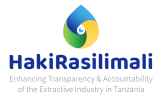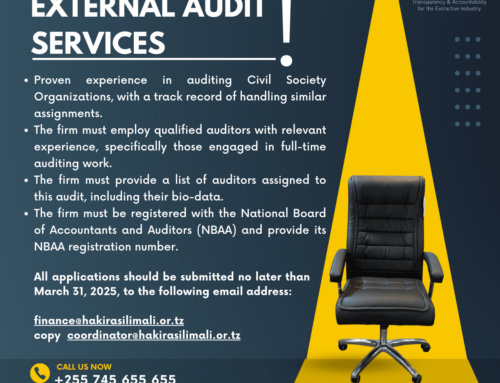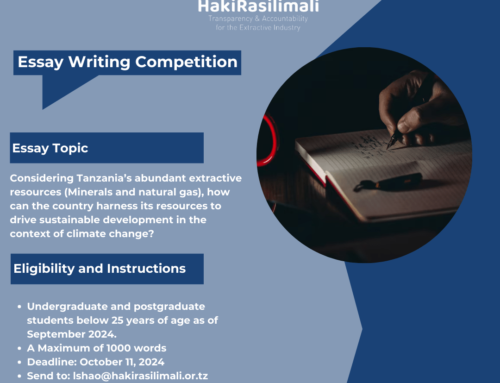Policy Forum (PF) was invited to attend a workshop on the promotion of transparency and accountability of revenue from the extractive industries (energy and minerals) hosted by the East African Legislative Assembly (EALA), the National Democratic Institute (NDI), and Revenue Watch (RW). We have reproduced hereunder what we observed and noted. Please treat these remarks with due caution, as they are merely indicative (and not authoritative) of what transpired. However, for the workshop resolution, please click here .
EALA WORKSHOP: Promoting Transparency & Accountability of Revenue from Extractive Industries
February 28 – 29, Kibo Palace, Arusha
Organisers: NDI, EALA, Revenue Watch
Invited guests: PF, PNoWB (Policy Network on the World Bank—an independent group of parliamentarians), ACORD TZ, IDASA, EALA parliamentarians, ICMM, et al.
Purpose: Mobilise group of legislators to facilitate change encourage best practice on the continent, and possibly draw lessons from shared experiences (RW example of Mongolia—new mining law and contract negotiations)
Day One: February 28, 2008
Session 1: Understanding the Demand for Transparency
Speaker: Sen. Mohammed Ahmed, Nigeria
Case study: Nigeria’s oil industry; bottom line: mistakes of the oil sector are not repeated with other minerals and natural resources
1st country to pass law on revenue transparency: Nigeria Extractive Industries Transparency Initiative (NEITI) Act, 2007
Speaker: Eddie Rich, Sr. Policy Advisor, EITI Secretariat
EITI primary focus is revenue disclosure and holding a multi-stakeholder committee involving Govt, civil society, and companies (supported by a national EITI Secretariat) that will oversee the process and create interest and understanding of information given which is critical to ensuring good governance of extractive industries.
EITI is seeking support from the UN and AU on demand for transparency. Future goal is to set EITI as a financial/international accounting standard.
Apparently requirement for transparency increased revenue by USD 1 BN (through prospective application)
Key Role of Legislators emphasised:
- Make/shape laws
- Where represent constituents with presence of extractive industries—it is a direct interest
- Oversight/monitoring process (have power to understand what is in the public coffers)
- Engage in multi-stakeholder committee
EITI creates linkages with organisations/advises on best practice/guardians of the global standard but implementation is ‘country-owned’ and the creation of a multi-stakeholder committee is CRITICAL to creating effective accountability and possible forum to renegotiate contracts, which is not within EITI’s remit.
Confidentiality clauses – not yet a focus of EITI; revenue must be transparent regardless of clauses in contract as otherwise country will not be EITI compliant
Session 2: Enhancing Knowledge of the Extractive Industries
Speaker: Lerato Makwetla, AngloGold Ashanti (NB speaking as ICMM- International Council on Mining & Metals)
ICMM is a CEO-led organisation, with members including regional and national commodity organisations and associations (eg World Gold Council)
Industry leaders who contribute to raise standards and develop good operational practices. It is a platform for sharing experiences and best practices.
Huge benefits from mining accrue at national level therefore long-term impact contingent upon how the central government uses such revenue to ensure that the benefits trickle down to the local communities.
Speaker: Keith Myers, Richmond Energy Partners (geologist)
Africa supplies 10% of the world’s oil (Nigeria, Angola, Libya, Algeria, and Egypt)
Comparison between Nigeria and China (in terms of development):
1975: Nigeria’s GDP was higher than China
1980: China had caught up with Nigeria (i.e. GDP on par)
2008: China’s GDP is FIVE TIMES HIGHER than Nigeria’s
Bottom line: “you don’t pump your way out of poverty, you trade your way out.”
Uganda: oil discovery on Lake Albert
Key questions legislators must ask:
- How much oil is there (seek independent view in order to get best available information as opposed to merely using findings of companies)
- What best to do with the oil (i.e. what development are we going to get from the oil)
The focus should not be about getting revenue divided properly (the cake analogy!); it should be about what’s the purpose of the oil?
- What is the best way to govern the oil?
- There is no ideal way of contending with it, but key principles are necessary
- There are 3 functions which the Govt will need to determine which agencies will carry them out: policy-making, regulatory, and operational.
- 5 governing principles:
i. Clarity of role and responsibility
ii. Sustainability (ensure decisions that are made lead to sustainability in the institutions and development)
iii. Enabling of institutions (i.e. must capacity build)
iv. Accountability for decision-making & performance of agencies
v. Transparency: to be accountable you need to be transparent throughout the government and governance regime and in order to be transparent, you need information.
Session 3: Legal & Regulatory Frameworks
Speaker: Bjorn-Erik Leerberg, Esq. Simonsen Law Firm
The law will not work unless the context is understood.
The principles of long-standing values can be enshrined
E.g. of Norway:
Principles of governance—-institutions & administration—-petroleum policy—petroleum policy rights
(all of these must be aligned)
The laws must be consistent/transparent/predictable
The focus must be shifted from revenue to impact on the entire economy (e.g. land, tax, etc)
“if you cannot protect it, you cannot develop the resource.”
Need to have a group of people that are consistent (in ideology/principles) so that the direction of the gas & oil policy does not change in order to protect the rights of the minority and not to govern by the majority.
“if you don’t control the costs, you don’t get the revenue.”
Critical test on any policy/law/decision made by any civil representative/servant:
If society as a whole doesn’t benefit from the exercise/activity, then don’t follow it/enact it.
Session 4: Encouraging Public Accountability and Transparency
Speaker: Stefan Gilbert, IDASA
A report on oil and governance reviews of Chad, Angola, Gabon, Sao Tome e Principe will be available in March 2008.
Core issues considered:
- Governance (political will) – how are decisions made & by whom
- Institutional capacity & relationships – (composition of parliament, independence, capacity and culture of dialogue within parliament & political parties)
- Civil society capacity (human and financial resources—they are either co-opted or leave; legitimacy & credibility)
- Modes of engagement (discussed in greater detail in the report country-by-country)
Critical Question: what are the pros and cons for parliamentarians to be publicly accountable and transparent?
Speaker: Dickens Kamugisha, CEO, AFIEGO
Uganda: key emphasis on access of information and importance of public space for CSOs to be effective, as well as capacity building in order to understand the sector.
It is not a lack of laws, but the lack of enforcement (e.g. Access to Information Act)
Speaker: Hon. Dombo Lumala Emmanuel, Chairperson of the Natural Resources Committee Parliament of Uganda
On CSOs: Parliamentarians seek CSOs and their work as a complimentary resource.
Parliamentarians must ensure that international agencies do not compel parliamentarians to make decisions which may not necessarily be in the best interest of the public.
“corruption survives due to concealment of information.”
The challenge is to ensure that whatever is done by the Govt is done in the public domain. E.g. Take the best practice examples in the region: in Rwanda, MPs cannot trade with Govt (when this law was passed, a number of MPs resigned).
Day Two: February 29, 2008
Session 5: Promoting Legislative Engagement and Oversight
Recap of discussions from previous day by John Johnson, NDI
–indication that one of the key issues was not to do with a lack of money but a lack of skills in the extractive industries.
Speaker: Hon. Festus Limbu, MP & member of the Public Accounts Committee, former Deputy Minister, Ministry of Finance
- Promote legislative engagement & oversight (eg. In Tanzania)
National Assembly finally has its own budget/employees/plan & developing its strategic 5 yr plan
- Alex Stewart Assayers (1.9% of export revenue) – commissioned by the BOT and Ministry of Finance to audit the gold mining industry in Tz
- Bomani commission (CSO have no official input—NB Mining Report by Tundu Lissu and Mark Curtis launched March 4, 2008)
- value for money audits (avoid Alex Stewart Assayers repeat)
Richmond contract explained
- Net result/recommendation: Parliament should have access to Govt contracts between the executive and companies AND they should be placed at the National Assembly Special Reserve.
- Govt to provide parliamentarians with ample time to analyse/deliberate the budget (at least 4 months)
Speaker: Hon. Don Ogalo, member EALA
- recognising that CSOs are a resource, need to develop a catalogue of CSOs so that parliamentarians have easy reference to CSOs and their competences;
- need for parliamentarians to use existing regulatory frameworks (particularly statutes, such as the Appropriation Act in Kenya) to critically engage with the executive and exercise the oversight function;
- need for parliamentarians to use the select committees to investigate legislation and govt policies/actions
- need for parliamentarians to pose key questions to ministers and deputy ministers, particularly at critical times such as when the executive seeks approval of its budget.
- need for parliamentarians to shift away from party politics to national politics (i.e. to act in the interest of the nation vs party interests)
Plenary Session: Adoption and approval of recommendations as well as possible EALA resolution (once final version received from NDI will upload onto PF website. However, roughly these are a number of the recommendations captured in note-form)
- EALA to lead the process of promoting transparency in extractive industries in member countries;
- Establishment of an East African Parliamentary Institute in Arusha to provide capacity building on a wide range of issues, including good governance;
- Encourage member states to consider joining EITI;
- Link EALA on extractive industries with national parliaments with a view to harmonising legislations;
- Train legislators in asking the right questions about transparency in extractive industries;
- Identify and establish collaborations with partner institutions like PNoWB, NDI, RW for mobilisation of financial resources for implementing the EALA plans on promoting transparency in extractive industries.
For further information, please contact Vera Mshana, Manager of Policy and Budget Analysis at the PF Secretariat.




